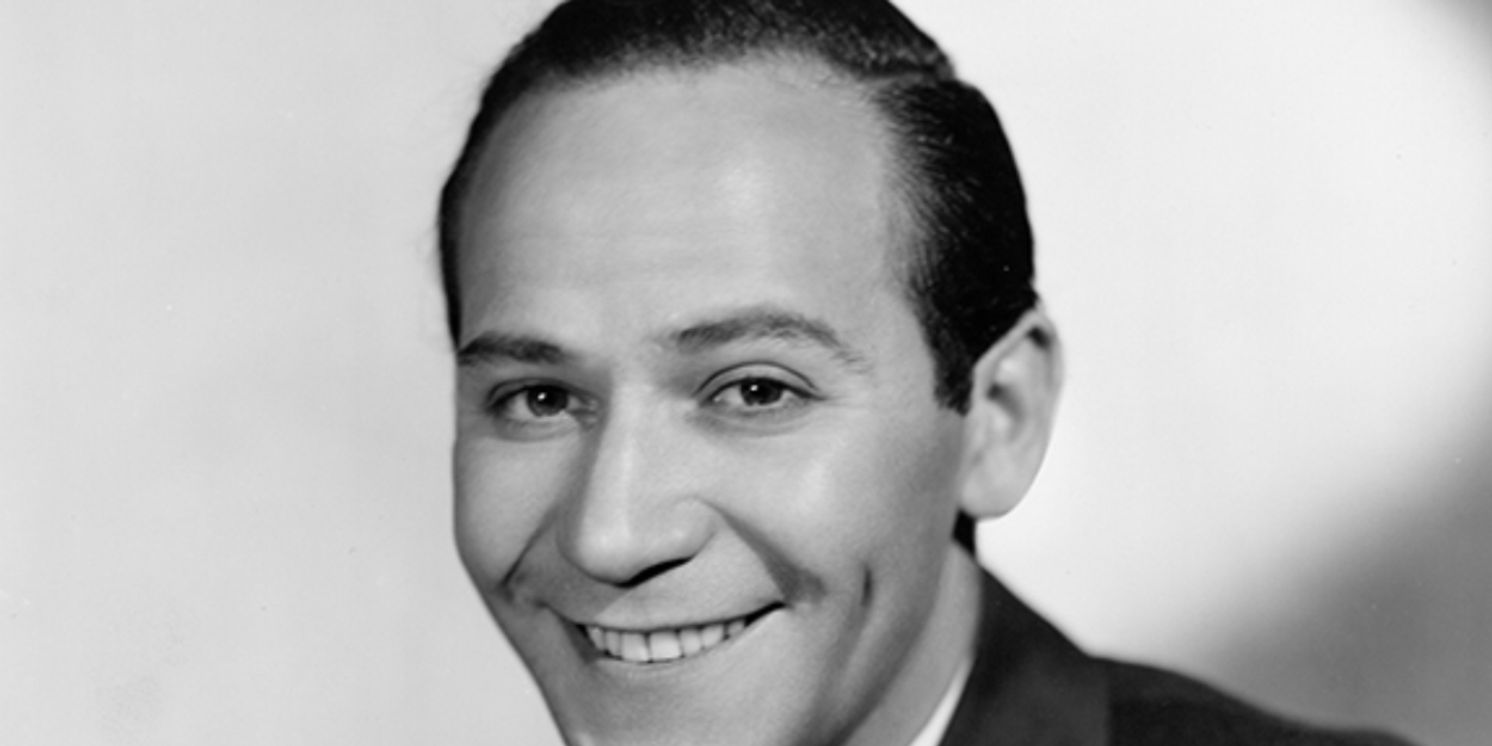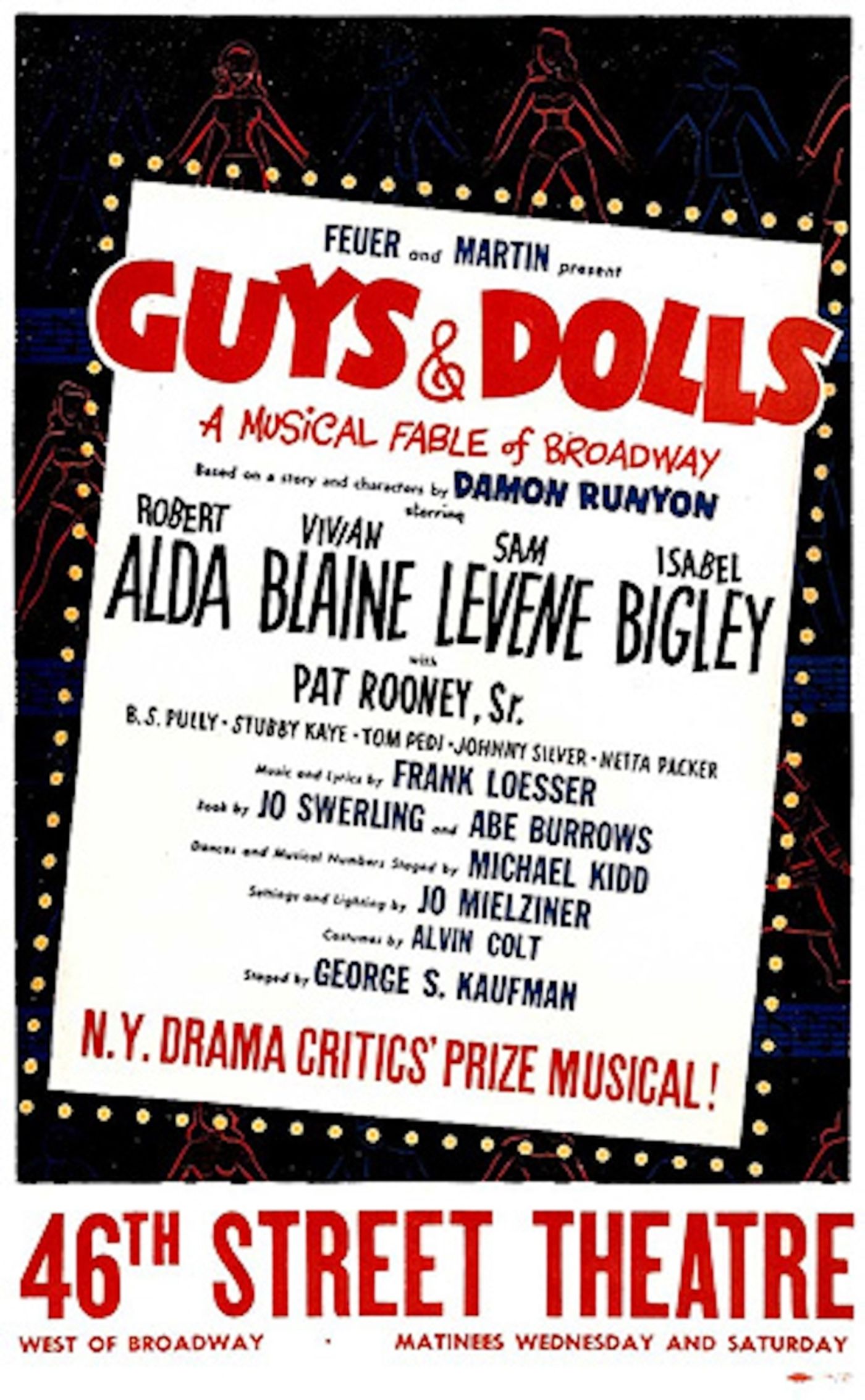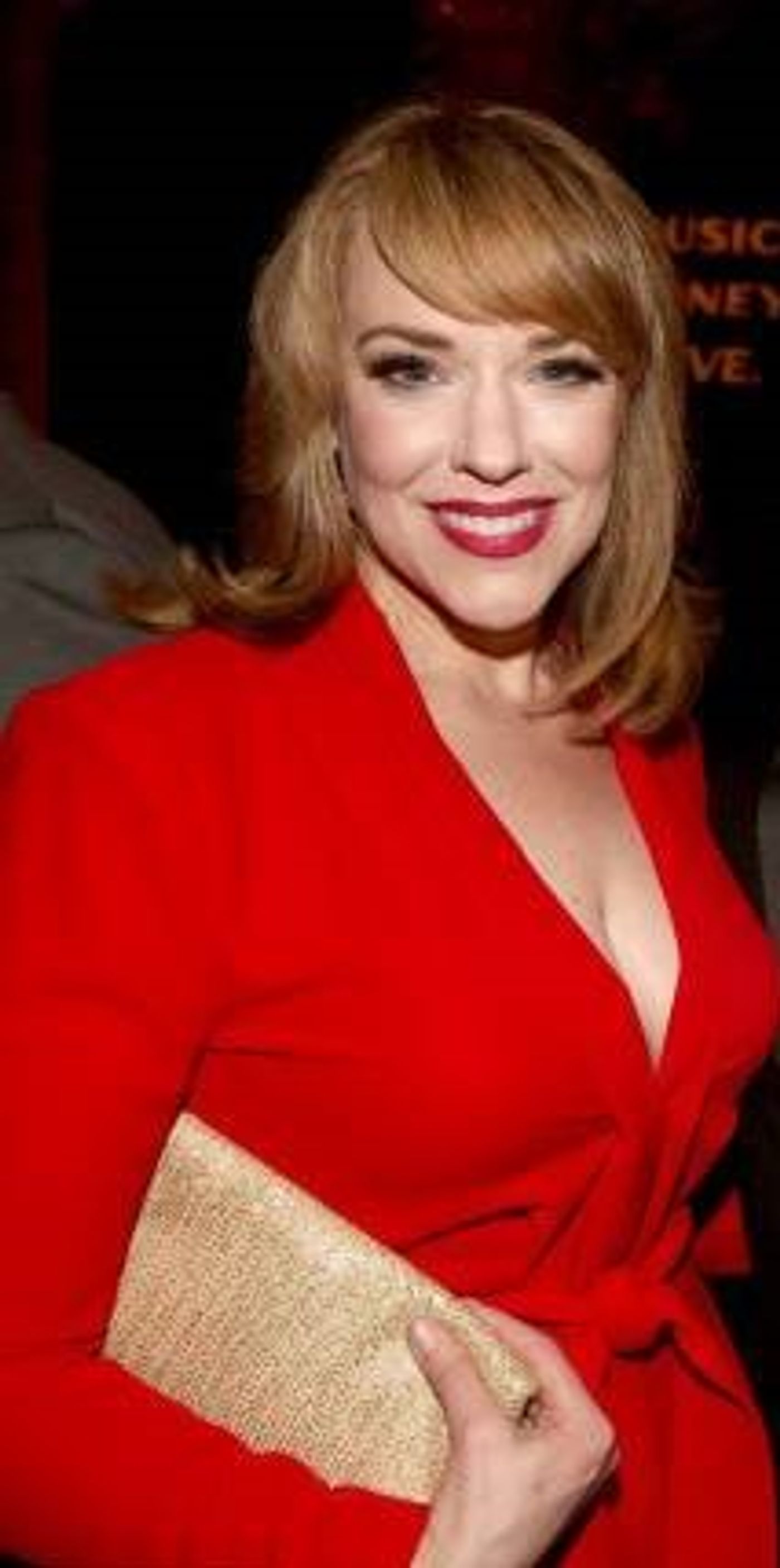Review: BABY, IT'S COLD OUTSIDE Renews Warm Memories of Frank Loesser's Songs at Dizzy's Club
The guy who wrote the "Guys and Dolls" songs and other gems gets a "Songbook Sundays" salute.

Celebrations of the classic Great American Songbook can be pretty great. Even as years go by and that songbook’s pages start to turn yellow, many actually become golden, or – to extend the color reference – evergreen. And sometimes still red hot. Frank Loesser, one of the major songwriters contributing to musical theatre, films, and stand-alone standards got the spotlight this time at the Songbook Sundays series at the DIzzy’s, the dazzling performance room in the Jazz at Lincoln Center complex. .jpg?format=auto&width=1400) Hearing that I’d be hearing the work of this versatile songsmith (1910-1969) for the January installment made this admirer the most happy fella, to borrow the title of one of Loesser's formidable musicals. A four-piece jazz band was led by pianist Joe Davidian. The program featured three singers – Emily Skinner (who opened the proceedings with a lovely “What Are You Doing New Year’s Eve?”), Matthew Scott, and Ekep Nikwele. Their numbers were all solos, with the sole exception of a fun finale where all three joined in on “If I Were a Bell” from Guys and Dolls. The ever-radiant creator/curator/host of the series, Deborah Grace Winer (thankfully talking to us with FYI facts without reading from notes or meandering) made the point early on that, as she sees/hears it, Loesser’s work can be thought of as falling into two categories: (1): songs from Guys and Dolls, and (2): everything that isn’t Guys and Dolls.
Hearing that I’d be hearing the work of this versatile songsmith (1910-1969) for the January installment made this admirer the most happy fella, to borrow the title of one of Loesser's formidable musicals. A four-piece jazz band was led by pianist Joe Davidian. The program featured three singers – Emily Skinner (who opened the proceedings with a lovely “What Are You Doing New Year’s Eve?”), Matthew Scott, and Ekep Nikwele. Their numbers were all solos, with the sole exception of a fun finale where all three joined in on “If I Were a Bell” from Guys and Dolls. The ever-radiant creator/curator/host of the series, Deborah Grace Winer (thankfully talking to us with FYI facts without reading from notes or meandering) made the point early on that, as she sees/hears it, Loesser’s work can be thought of as falling into two categories: (1): songs from Guys and Dolls, and (2): everything that isn’t Guys and Dolls.  So, it wasn’t surprising that the program contained four samples of that score, if anyone besides me was keeping score and missing what was missing representation. (Where’s Where’s Charley? Can the set try to succeed without How to Succeed in Business Without Really Trying? It could have been fun to have one of the musicalized tales from Hans Christian Andersen, but that’s another story.) The only sample from the massive score to The Most Happy Fella was Matthew Scott’s distinctive and disarmingly vulnerable “Somebody, Somewhere,” written for a female character. Gender-switched the other way from its own Broadway origins was Greenwillow’s declaration “Never Will I Marry” introduced in the musical by Anthony Perkins, but more frequently covered by female singers over the years. Young singer Ekep Nikwele turned up its steely determination until its assertiveness was quite harsh and ferocious. Unlike her co-stars who left the jazz flavorings to the band’s mid-song instrumental breaks, this singer dove deep into the stylings and liberties of that genre in her hard-swinging vocals. When it came to her treatment of the Guys and Dolls confession “I’ve Never Been in Love Before,” she also attacked it in an abrasive manner, unfortunately denying the number any of its sense of discovery or awe. With a couple of its lyric lines, which repeat, she (intentionally?) altered them, which was distracting (“I’ve really never been in love before” became “I’ve never really been in love before”; “I’m full of foolish song” was turned into “My heart’s a foolish song”; and “I thought I knew the score” became “I swore I knew the score” which doesn’t mean the same thing, but it does tickle the ear with an extra rhyme.) So, when her final solo, “Say It (Over and Over Again),” revealed her ability to be calm and cozily cuddling up to romance, the pretty side of her voice came as a welcome surprise. Its melody is by Jimmy McHugh, a sample of the early period of Loesser’s career when he was most often contributing only the words. Bassist Mark Lewandowski had a nifty solo in this piece. Another McHugh/Loesser ballad, “Let’s Get Lost,” was presented by Matthew Scott, with more energy and less of a dreamy feel than many might expect if, as Miss Winer guessed, the jazz-leaning audience mainly associate it with Chet Baker’s languid interpretation. Her supposition seemed on target as there were audible reactions of surprise when she pointed out that it was actually introduced by Mary Martin in a movie. (Happy Go Lucky, 1943).
So, it wasn’t surprising that the program contained four samples of that score, if anyone besides me was keeping score and missing what was missing representation. (Where’s Where’s Charley? Can the set try to succeed without How to Succeed in Business Without Really Trying? It could have been fun to have one of the musicalized tales from Hans Christian Andersen, but that’s another story.) The only sample from the massive score to The Most Happy Fella was Matthew Scott’s distinctive and disarmingly vulnerable “Somebody, Somewhere,” written for a female character. Gender-switched the other way from its own Broadway origins was Greenwillow’s declaration “Never Will I Marry” introduced in the musical by Anthony Perkins, but more frequently covered by female singers over the years. Young singer Ekep Nikwele turned up its steely determination until its assertiveness was quite harsh and ferocious. Unlike her co-stars who left the jazz flavorings to the band’s mid-song instrumental breaks, this singer dove deep into the stylings and liberties of that genre in her hard-swinging vocals. When it came to her treatment of the Guys and Dolls confession “I’ve Never Been in Love Before,” she also attacked it in an abrasive manner, unfortunately denying the number any of its sense of discovery or awe. With a couple of its lyric lines, which repeat, she (intentionally?) altered them, which was distracting (“I’ve really never been in love before” became “I’ve never really been in love before”; “I’m full of foolish song” was turned into “My heart’s a foolish song”; and “I thought I knew the score” became “I swore I knew the score” which doesn’t mean the same thing, but it does tickle the ear with an extra rhyme.) So, when her final solo, “Say It (Over and Over Again),” revealed her ability to be calm and cozily cuddling up to romance, the pretty side of her voice came as a welcome surprise. Its melody is by Jimmy McHugh, a sample of the early period of Loesser’s career when he was most often contributing only the words. Bassist Mark Lewandowski had a nifty solo in this piece. Another McHugh/Loesser ballad, “Let’s Get Lost,” was presented by Matthew Scott, with more energy and less of a dreamy feel than many might expect if, as Miss Winer guessed, the jazz-leaning audience mainly associate it with Chet Baker’s languid interpretation. Her supposition seemed on target as there were audible reactions of surprise when she pointed out that it was actually introduced by Mary Martin in a movie. (Happy Go Lucky, 1943).
The emotional highlight of the concert for me was Emily Skinner’s wistful reflections about a break-up with another screen-born item, “Spring Will Be a Little Late This Year.”
 Side-stepping immersion in misery, a mature perspective informed the outlook, looking forward to the light of recovery at the end of the tunnel confirmed in the belief that “Time heals all things, so I needn’t cling to this fear.” A calibrated and becoming use of vibrato added to the bittersweet effect. The four-piece band jumped into the music with obvious skill and dexterity. Sax player Daniel Cohen often seemed to more conservatively (in a good way) anchor the musical journey by most loyally restating the melody during instrumental breaks when things got notably “busy” and dense in variations and side journeys; some arrangements were notably “busy,” albeit adventurous. Drummer Maria Marmarou brought some pow on the upbeat numbers. All four musicians got moments to shine during “Moments Like This,” the one instrumental-only selection. It was an odd choice for a celebration of Frank Loesser since the melody was actually the work of Burton Lane and Loesser only wrote what we were NOT hearing: the words! There are so many rich melodies BY Loesser than could have taken that spot. But I must admit that the band did a great rendition, making me shrug and echo, in my head, the unheard last line of the chorus: “But at moments like this, who cares?”
Side-stepping immersion in misery, a mature perspective informed the outlook, looking forward to the light of recovery at the end of the tunnel confirmed in the belief that “Time heals all things, so I needn’t cling to this fear.” A calibrated and becoming use of vibrato added to the bittersweet effect. The four-piece band jumped into the music with obvious skill and dexterity. Sax player Daniel Cohen often seemed to more conservatively (in a good way) anchor the musical journey by most loyally restating the melody during instrumental breaks when things got notably “busy” and dense in variations and side journeys; some arrangements were notably “busy,” albeit adventurous. Drummer Maria Marmarou brought some pow on the upbeat numbers. All four musicians got moments to shine during “Moments Like This,” the one instrumental-only selection. It was an odd choice for a celebration of Frank Loesser since the melody was actually the work of Burton Lane and Loesser only wrote what we were NOT hearing: the words! There are so many rich melodies BY Loesser than could have taken that spot. But I must admit that the band did a great rendition, making me shrug and echo, in my head, the unheard last line of the chorus: “But at moments like this, who cares?”
Songbook Sundays is a presentation of Jazz At Lincoln Center (website HERE) that is presented at Dizzy's Club (homepage HERE).
Reader Reviews
Videos

